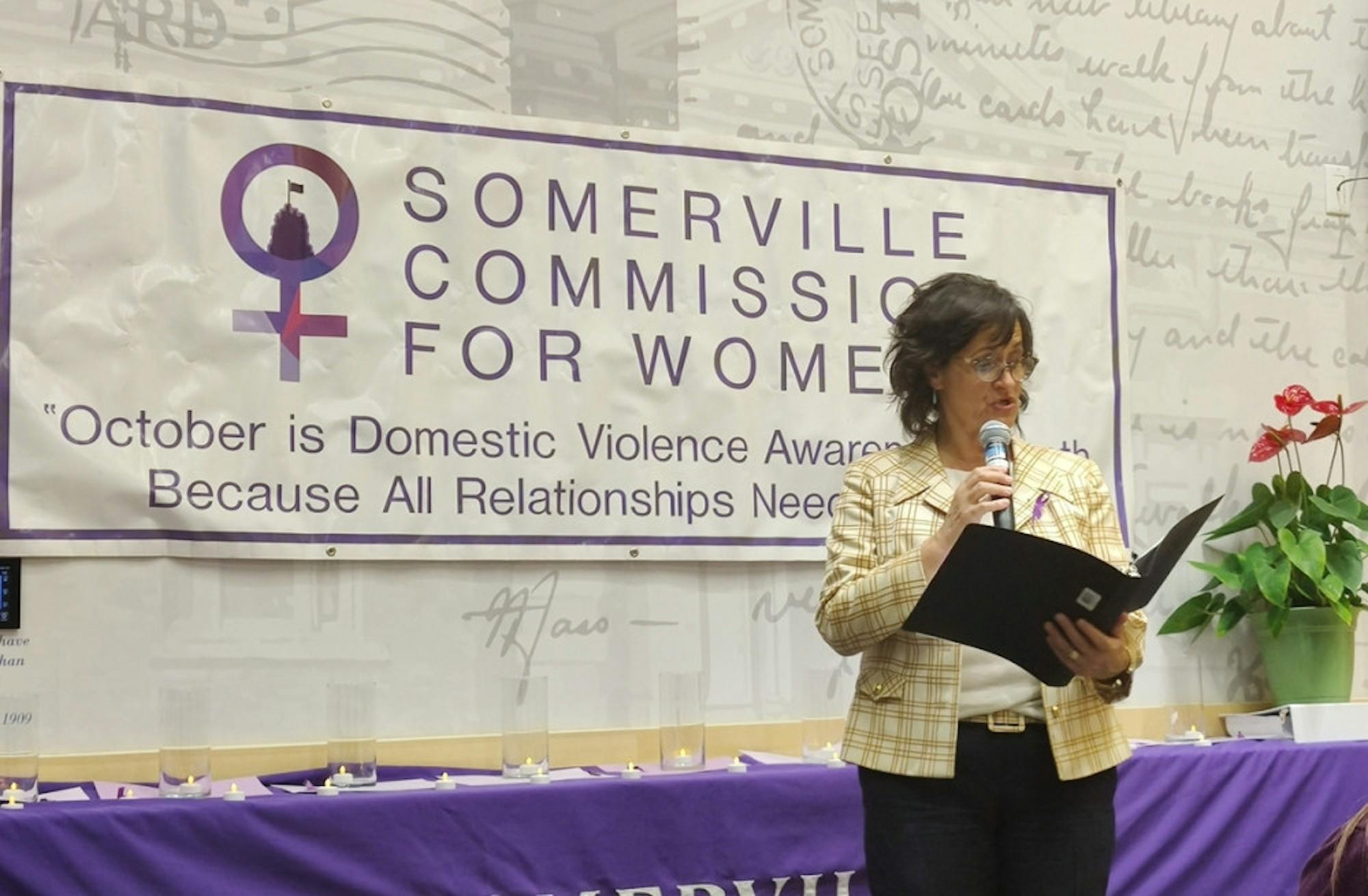Members of the Somerville community came together on Wednesday evening for the city’s annual Domestic Violence Vigil, mourning lives lost to domestic violence this year. Held at the West Branch of the Somerville Public Library, the vigil was organized by the Somerville Commission for Women and RESPOND, New England’s oldest domestic violence prevention agency. Mayor Katjana Ballantyne gave opening remarks at the vigil.
“I think we can all agree we wish we didn't have to be here,” Ballantyne said. “We long for the day that there’s not a single name to be read off a victims list and domestic violence no longer proliferates in our community. But until then, we continue to come out together each October during National Domestic Violence Awareness and Prevention Month to mourn those we’ve lost, speak out about the cause of this enduring crisis, share lifesaving resources and recommit to building a safe, more just world where all people can live free from abuse.”
Speakers at the event also included Stephanie Galaitsi, a commissioner on the Somerville Commission for Women, Maureen DiPaolo, a victim’s advocate for the Somerville Police Department, Crystal Turner, a co-chair of the Somerville Commission for Women and Victoria Helberg, CEO of RESPOND Inc. The event concluded with a reading of victims’ names and a moment of silence.
“Yes, we're here at the vigil to mourn. But let's keep in mind what the word ‘vigil’ means. The word ‘vigil’ itself comes from the Latin word for ‘awake,’ and all of its meanings include the idea of watchfulness,” Turner told the audience. “So with that being said, let us remember to be watchful. Let us be on guard and be alert. Let us remember to advocate for those who need it the most. It's our hope and belief that we can change the statistics and to break the cycle to create a space where a home can truly be a home.”
According to statistics from the National Coalition Against Domestic Violence, approximately 1 in 4 women and 1 in 7 men have been severely physically abused by an intimate partner in their lifetime. However, these statistics only refer to bodily harm; domestic abuse encompasses many forms of violence beyond the physical, including financial abuse, emotional abuse and verbal abuse.
“Domestic violence is about power, coercion and control,” Greta Hagen, director of philosophy and engagement at RESPOND, said in an interview with the Daily. “It could look like a lot of different things … it really is about one person taking control over the decisions that belong to somebody else.”
While the phrase “domestic violence” might evoke images of older, married couples fighting in their homes, it is also present among college populations, including Tufts’ campus. Tufts’ Center for Awareness, Resources and Education, a free, confidential resource, offers trauma-informed emotional support to students coping with domestic abuse, whether at home or at Tufts.
“Primarily what I see is the dating violence,” Alexandra Donovan, director of Tufts’ CARE team, explained. “Students that are in relationships that are extremely controlling, both physically dangerous as well as ones that don’t include physical violence but that include everything else that you could possibly imagine: emotional abuse, verbal abuse, psychological abuse, controlling behaviors.”
Students can help combat domestic violence on campus, Donovan said, by first noticing its signs: Has your friend withdrawn from spending time with you or talking to you? Are they having frequent mood swings? Are they still doing the things that they love? Do they have any physical marks that are unexplainable?
“Bring it up to [your friend] in a place that you’re both comfortable, in a way that’s private,” Donovan advised. “Bring it up to them that you’re concerned, and specifically mention the behaviors that you’re concerned about. … Let them know that you’re there, that you’re concerned, and that you will always be there, no matter what.”
Recent legislative action at the state level aims to prevent domestic violence. RESPOND has joined forces with Jane Doe Inc., a coalition of domestic violence and sexual assault centers across Massachusetts, to advocate for the Healthy Youth Act, which would mandate comprehensive, gender-affirming curricula in public schools offering sex education. The proposed curricula would devote particular focus to teaching students about what healthy relationships look like. In 2017, the Massachusetts State Senate overwhelmingly passed the Healthy Youth Act, but it has yet to pass through the House.
“Voting and getting involved with policy that does support survivors and that supports funding for survivor services … is one way to be an active or empowered bystander or upstander,” Hagen said.
At the vigil, Ballantyne emphasized the importance of breaking the stigma around discussing and addressing domestic violence.
“I can offer one call of action: talk about [domestic violence],” Ballantyne said. “Talk about its prevalence, talk about resources available, talk about harmful behaviors and patterns. Because domestic violence thrives in silence … speaking up is hard. It can be really hard. But the more we do so openly and candidly, the more we can change the narrative about what domestic violence is, support those who are experiencing it and ultimately prevent it entirely.”






